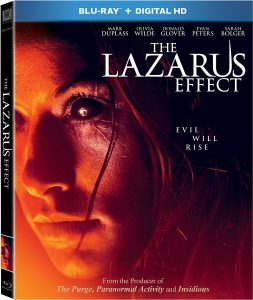“The Lazarus Effect,” a horror flick that recently hit the cheap theaters, is arguably not even as good as one of the weaker Season 1 “X-Files” episodes. In that episode, titled “Lazarus,” two people switch bodies at the point of near-death, leading to a mystery that Mulder and Scully must solve in 44 minutes.
“The Lazarus Effect” — the title refers to a Biblical character resurrected from the dead in one of Jesus’ miracles — spends 90 minutes on a shallower riff on the theme. Zoe (Olivia Wilde) is electrocuted in a lab accident. Her fiancé and fellow scientist, Frank (Mark Duplass, for some reason), brings her back to life using a serum, as they conveniently happened to be experimenting on bringing pigs and dogs back from the dead.
“Lazarus Effect” has elements not only of the “X-Files” episode, but also of “Lucy,” a recent Scarlett Johansson movie about a woman who can use 100 percent (rather than the standard 10 percent) of her brain at once. In the case of Zoe, it starts with a couple of “X-Men”-style powers: Telekenesis and telepathy.
But the similarity that most jumped out at me was “Event Horizon” – “Lazarus Effect” feels a lot like a low-budget version of that slick 1997 sci-fi/horror movie about a spaceship orbiting Neptune that gets sucked into hell. While “Lazarus Effect” isn’t nearly as scary (or maybe I’m more immune to being scared now), director David Gelb makes great use of the university basement lab setting. The rooms are divided by glass partitions, allowing for lots of reflections and shadows. Some entire shots are done via reflections in the glass rather than a straight-on shot.
For all the touchstones, though, “Lazarus Effect” doesn’t delve deeply into any of the themes. Writers Luke Dawson and Jeremy Slater touch upon the creepy idea that Zoe was in hell during her brief death, and is now terrified of returning there – a flip-flop of the horror Buffy experienced in “Buffy” Season 6 when she was ripped out of heaven. But the movie becomes a pure scarefest thrill ride after that, so we don’t have time to fear for Zoe’s eternal fate. Furthermore – although there’s obviously room for artistic license when dealing with metaphysical ideas – Zoe wears a cross, but the film doesn’t understand the hell of the Christian religion, which is not a punishment for Earthly actions, but a consequence of not giving oneself over to God.
Still, I can’t be too hard on the film, because the characters – rounded out by lab assistants Clay (Evan Peters, Quicksilver in “X-Men: Days of Future Past”) and Niko (Donald Glover from “Community”) and videographer Eva (Sarah Bolger, the older sister in from “In America,” an outstanding 2003 film I had forgotten about) – are fun to watch. Bolger, now 24, in particular stands out with an Emma Stone mixture of toughness and vulnerability that makes you want to root for her. I wouldn’t be surprised if she gets lead roles soon.

And once “Lazarus Effect” decides it’s going to set the big ideas aside and just be a strobe-light-filled thriller, it runs through its final act quickly rather than dragging things out. While it’s an unnecessary addition to the horror genre, “Lazarus Effect” is also inoffensive, featuring a standout cast, an evocative setting, and – best of all – a short run time.

